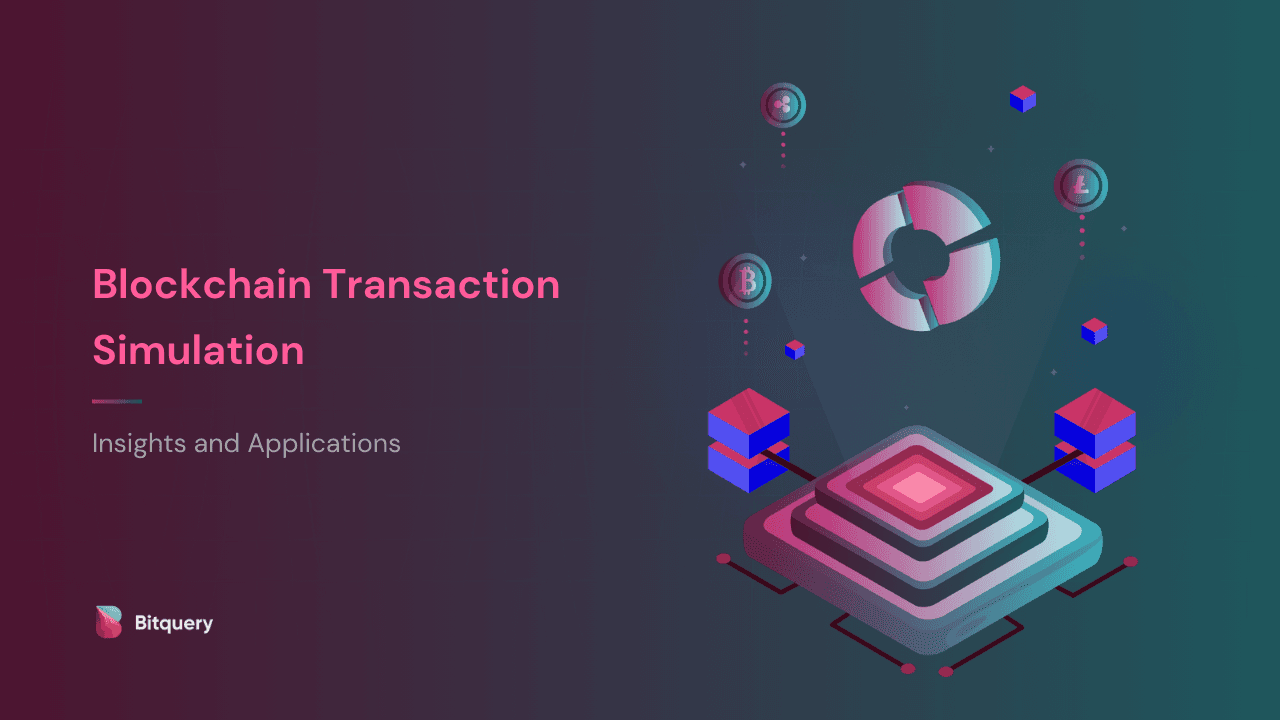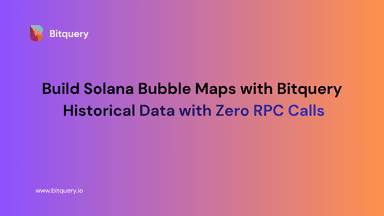
Blockchain Transaction Simulation: Insights and Applications
Transaction simulation refers to the process of emulating the execution of transactions within a blockchain network without broadcasting them, offering developers a sandbox environment to test their applications. Think of transaction simulation in blockchain networks like a developer sandbox where you can test your code without affecting the live system, similar to how a virtual machine lets you experiment with software configurations without impacting your main operating system.
It is crucial for developers to validate smart contracts, optimize gas usage, and ensure the reliability of their applications before deployment. Let’s discuss a few applications briefly.
- Smart Contract Development: Testing computer programs (smart contracts) on the blockchain before officially using them.
- Scalability Testing: Checking how well the blockchain handles a lot of transactions.
- Security Testing: Making sure the blockchain is safe from hackers or mistakes.
- Protocol Optimization: Tweaking the rules of the blockchain to make it work better.
- DApp Testing: Trying out apps built on the blockchain to see if they work right.
- Gas Optimization: Figuring out the cheapest way to use the blockchain.
- Fork Testing: Seeing what happens if the blockchain splits into different versions.
How does Transaction Simulation work?
Input Parameters:
Simulation typically starts with defining input parameters such as the transaction type (e.g., transfer, contract execution), sender address, receiver address, gas limit, gas price, etc.
Validation:
Initial validation ensures that the provided input parameters are valid and feasible for the simulation. This involves verifying the integrity of addresses, the validity of the transaction type, and adherence to protocol-specific constraints.
State Initialization:
The simulation initializes the state based on the current state of the blockchain. This includes fetching the latest balances, contract codes, and other necessary data.
Gas Estimation:
Gas estimation is crucial to determine the computational cost of executing the transaction. Each operation within the transaction is evaluated to determine its gas consumption based on factors such as opcode cost, memory usage, and storage access.
Terminologies used:
- Opcode: EVM Opcodes are the fundamental instructions understood and executed by the Ethereum Virtual Machine (EVM) during the processing of smart contracts. They dictate specific operations such as arithmetic calculations, data manipulation, and control flow within the smart contract bytecode. Each opcode has an associated gas cost, which determines the computational resources required for its execution on the Ethereum network.
Execution:
The transaction is simulated by executing the operations specified in the input parameters. This involves updating the state according to the transaction logic, such as transferring funds, updating contract storage, etc.
Gas Consumption:
During execution, the gas consumed by each operation is tracked. If the gas limit specified in the input parameters is exceeded, the simulation halts, and the transaction is considered invalid.
Output Evaluation:
This includes checking for errors, verifying that the transaction was successful, and determining the resulting state changes.
Reversibility Check:
In testing environments where transaction reversibility is critical, a reverse simulation may be conducted to assess the impact of undoing the transaction. This involves rolling back state changes and evaluating the consistency of the blockchain state post-reversion.
Terminologies used:
- Rollback State: Rollback state means going back to how things were before a transaction happened. It's like pressing an undo button to reverse any changes made.
- Post-Reversion: Post-reversion refers to the state of things after the rollback has been done. It's the situation or condition after everything has been reverted to its previous state.
Role of Bitquery Mempool API
Bitquery Mempool API helps to perform in-depth analysis, validate transaction patterns, and identify potential bottlenecks in their applications. Additionally, it provides developers with access to simulated transactions over raw mempool data, offering a comprehensive suite of tools for analysis and optimization.
Terminologies used:
- Raw: Unprocessed or unrefined data in its original form, often referring to data directly obtained from the source without manipulation.
- Mempool Data: Data related to the transactions present in the memory pool of a blockchain network.
- RPC: Stands for Remote Procedure Call, a protocol that allows a program to execute code on a remote server.
- Providers: Entities or services that offer RPC interfaces to access blockchain data and perform operations remotely.
Streamlining Simulation Processes with the help of Bitquery Mempool API
Data Validation and Integrity Checks:
Transaction simulation in a virtual environment requires accurate mirroring of real-world scenarios. Bitquery Mempool API enables robust data validation and integrity checks, making it possible through:
- Comprehensive Data Access
- Rich Data Insights
- Customizable Queries
- Error Handling Mechanisms
Performance Optimization Techniques:
Optimizing transaction simulation performance is crucial for efficiency and accuracy. Bitquery Mempool API facilitates this through:
- Real-Time Data Updates
- Query Optimization
- Scalable Infrastructure
- Integration with Analytical Tools
Case Studies of Successful Transaction Simulations with the help of Bitquery Platform
DeFi Protocol Optimization:
- Problem: A decentralized finance (DeFi) protocol faced performance issues and high gas fees due to inefficient smart contract execution.
- Solution: Leveraging Bitquery's transaction simulation capabilities, the protocol's developers analyzed transaction patterns and identified optimization opportunities.
- Outcome: By fine-tuning smart contracts and optimizing gas usage based on simulation results, the DeFi protocol achieved significant performance improvements, reduced transaction fees, and enhanced user experience.
Optimizing Gas Usage for a Decentralized Exchange (DEX)
- Problem: A decentralized exchange (DEX) on the Ethereum network faced high gas fees and slow transaction processing times, impacting user experience and adoption rates.
- Solution: Leveraging Bitquery's transaction simulation capabilities, the development team conducted in-depth analysis of transaction patterns and gas usage within the DEX platform.
- Implementation and Outcome:
- Gas Optimization
- Transaction Prioritization
- Protocol Enhancement
- Cost Reduction
- Improved User Experience
- Increased Adoption
Challenges and Solutions
- Scalability: Ensuring scalability, especially when testing applications with a large user base, is a challenge. Bitquery addresses this by providing access to real-time mempool data and offering tools for analyzing transaction throughput and performance metrics.
- Accuracy: Achieving accurate transaction simulations is crucial for identifying potential issues and validating application functionality. Bitquery Mempool API offers reliable data sources and advanced simulation tools, enabling developers to simulate real-world transaction scenarios with precision and confidence.
Future Trends in Transaction Simulation
Transaction simulation is bound to evolve significantly in the coming years, driven by advancements in technology and increasing demand for secure and user-friendly tools in the blockchain ecosystem. Some potential future trends in transaction simulation include:
- Enhanced Security Measures
- Integration of Machine Learning and AI
- Deeper Integration with Blockchain Networks
- Cross-Chain Compatibility
- User-Friendly Interfaces and Educational Resources
- Integration with Decentralized Finance (DeFi) Protocols
- Regulatory Compliance Features
In conclusion, Bitquery Mempool API offers invaluable insights that can help you navigate the complexities of blockchain technology. From real-time monitoring to predictive analytics, this powerful tool equips you with the information you need to stay ahead of the curve and make smarter decisions. Dive into the possibilities with Bitquery Mempool API today.
About Bitquery
Bitquery is a set of software tools that parse, index, access, search, and use information across blockchain networks in a unified way. Our products are:
- Coinpath® APIs provide blockchain money flow analysis for more than 24 blockchains. With Coinpath’s APIs, you can monitor blockchain transactions, investigate crypto crimes such as bitcoin money laundering, and create crypto forensics tools. Read this to get started with Coinpath®.
- Digital Assets API provides index information related to all major cryptocurrencies, coins, and tokens.
- DEX API provides real-time deposits and transactions, trades, and other related data on different DEX protocols like Uniswap, Kyber Network, Airswap, Matching Network, etc.
If you have any questions about our products, ask them on our Telegram channel. Also, subscribe to our newsletter below, we will keep you updated with the latest in the cryptocurrency world.
Written by Dheeraj M
Subscribe to our newsletter
Subscribe and never miss any updates related to our APIs, new developments & latest news etc. Our newsletter is sent once a week on Monday.


